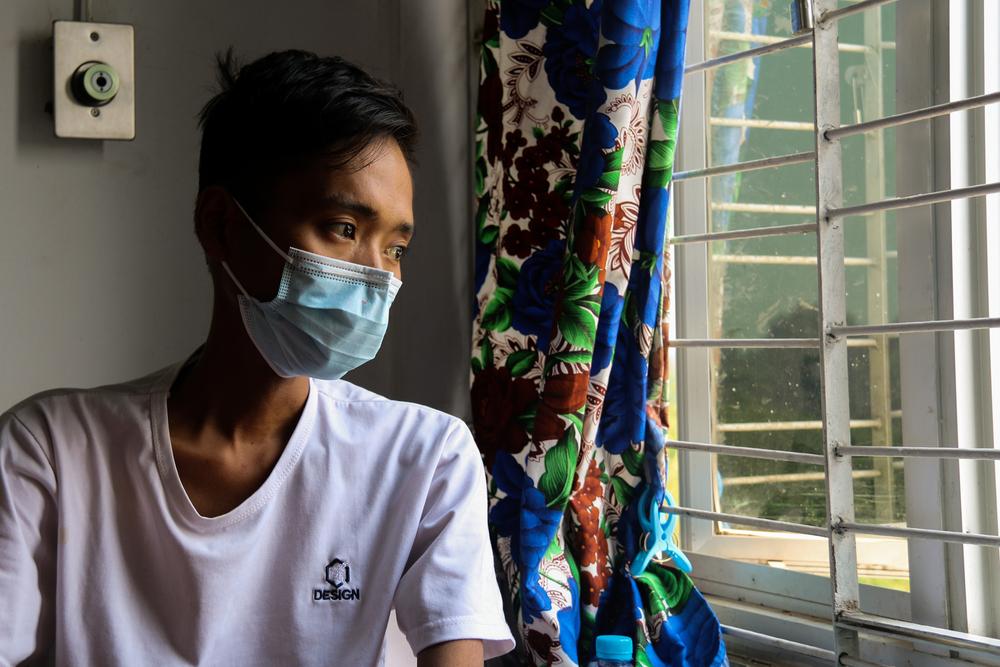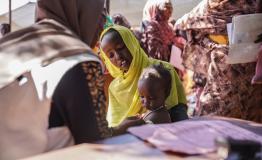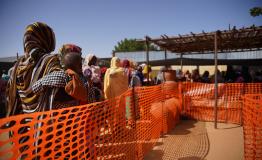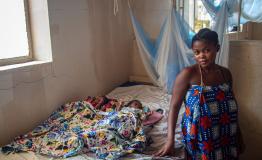We speak to Dr Mark Sherlock, Médecins Sans Frontières (MSF) Health Programme Manager for Myanmar. Dr Sherlock explains the current state of Tuberculosis (TB) care in Myanmar, a country gripped by armed conflict and where the health system is leveraged as a frontline of the political crisis to the detriment of patients it was built to serve.
What does MSF know about the prevalence of TB in Myanmar?
According to the latest report released by the World Health Organisation, Myanmar is still one of the 30 countries with a high TB burden and bears a triple burden of drug-susceptible TB (DSTB), drug-resistant TB (DRTB), and HIV-associated TB.
Progress was made in tackling this infectious disease until 2019 but the combination of COVID-19 and the collapse of the healthcare system due to the military takeover stalled and reversed this improvement in 2020 and 2021.
To give you a sense of this, the identification of newly diagnosed patients with TB fell by more than 20% in 2020, with a further decline in 2021. This was not because of a reduction of the disease in Myanmar, but due to a deadly combination of the effects of COVID-19 and a compromised and fragmented health system, which drastically reduced testing and treatment capacity.
60,000, people with TB were estimated to have gone undiagnosed and untreated during this period, increasing TB-related deaths, more TB transmission and more people developing resistant forms of TB.
This year however, official data from the National Tuberculosis Programme (NTP) shows that testing and identification of TB in Myanmar is reportedly moving back towards WHO targets – and is only just below what it was in 2019.1
Although this is good news, the data almost certainly mostly represents the Yangon Region, which is where 50% of the TB burden in Myanmar comes from. Since MSF started supporting the National Tuberculosis Reference Lab in 2021, we have seen a steady increase in the amount of testing that is performed monthly, with most samples coming from the Yangon Region.
However, in some of the more rural parts of the country where we work, it is a different story. With virtually no public services to support TB patients and challenges in accessing the existing ones, due, among others, to ongoing conflict in the country, people are struggling to get a timely diagnosis and treatment.
What are the main challenges for people in need of TB care?
In some parts of Myanmar, our patients tell us they delay seeking healthcare or are unable to reach their nearest facility because they are afraid to travel. Due to the on-going Civil Disobedience Movement (CDM), with a significant number of healthcare workers protesting the military take-over by walking out of their jobs, patients often arrive to a facility impacted by a shortage of staff and drugs.
Disrupted treatment or the inability for people to adhere to their treatment is not only risking fatal outcomes for patients but, will lead to an amplification of drug resistance and more complicated forms of TB becoming prevalent.
Even for those with access to care, timely diagnosis of DRTB can be challenging, as the only functional laboratory with specific testing capacity is in Yangon. Despite the efforts, the lab is overloaded with samples, leading to delay in results and treatment.
In addition, recovery from TB can be a very long process, sometimes up to two years and can include a significant hospital stay. These long treatment times put financial strain on DR-TB patients in Myanmar as they often must move away from home or quarantine in hospitals and clinics and cannot work.
TB diagnosis in children remains, as in many other countries around the world, a huge challenge. It usually goes completely undiagnosed, leading to preventable deaths. In fact, when diagnosed and treated properly, children have usually better outcomes than adults.
Our teams in Myanmar are providing regular support to NTP programmes at different levels, either supporting direct service provision (like in Yangon) or facilitating access to testing and treatment (like in Kachin, Shan and Rakhine).
TB, like other infectious diseases, goes beyond political and geographical borders and MSF is fully committed to the well-being of patients. We will do everything possible to facilitate the continuation of care for existing patients, access to effective testing and treatment for new patients, and mitigate as much as possible the public health threat of the emergence of dangerous resistant strains of TB.
Does this mean MSF is engaging with the military authorities?
Authorities, health actors and donors must engage with each other to rapidly improve the availability and quality of TB (including Drug Resistant-TB) care in Myanmar.
In any country where MSF provides services, we talk with all parties to a conflict. In Myanmar, this dialogue enables our teams to ensure continuity of support to existing patients and respond to emerging medical and humanitarian needs.
Globally, MSF has been involved in TB care for more than 30 years, and in Myanmar since 2002. While gradual progress back towards WHO targets is observed, we are witnessing a resurgence of widespread armed conflict and a continuing political crisis in Myanmar, which continues to drastically impact people’s ability to access not only the life-saving TB care they need but other essential healthcare services.
The progress noted above is fragile and this improvement is due to the support and funding of NGOs who have made up for staff shortages and increased lab testing capabilities. The gaps in the healthcare system created by the events of 2021 are still very apparent and we are always looking for ways to scale up our support to the national services to allow us to reach more patients.
What can be done to overcome some of the challenges you mention?
The commitment and plans from the Ministry of Health to implement the new all-oral shorter regimen for DR-TB (BPaL/M) in Yangon in 2023 are positive and provide a huge opportunity to improve patient outcomes. Sadly, rollout and further implementation at regional and township levels is so far only planned to start from 2024 and will be challenging, as people’s ability to access functioning health services safely continues to be impacted by the on-going crisis.
For this rollout to succeed, healthcare must be urgently de-politicized. This means the act of seeking and providing healthcare needs to be disassociated from the continuing political crisis. Patients must be able to receive medical care in safety wherever they reside at a functioning health facility, and doctors must be able to offer treatment in safety irrespective of which side of the frontlines they are on and which facility they are working in.
Additionally, NTP sites and national TB reference laboratories only function at minimal capacity and are not able to cope with the demand. Support from international organisations who provide technical expertise and equipment is critical and must be expanded, something MSF is committed to. Authorities should facilitate this by expediting arduous administrative processes that limit the activities of domestic and international healthcare service providers. Areas in conflict are of particular concern, as access to TB treatment for patients there is even more compromised. Ensuring the continuation of TB services should be facilitated by all parties to the conflict in Myanmar - irrespective of political affiliation, ethnicity, or residency of the patients seeking care.
Finally, international funding for Myanmar must be sustained to ensure patients are not abandoned. The availability of international funding will determine the possibility of improving access to TB care and other essential health services. Donors must take responsibility for ensuring that such funding goes to ensuring services for the most vulnerable first, and to services with substantial public health impact, which includes Myanmar’s National Tuberculosis Programme and services for patients in non-government controlled areas.



